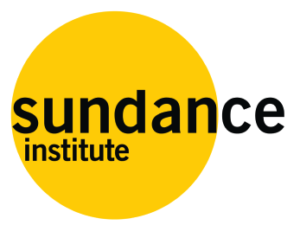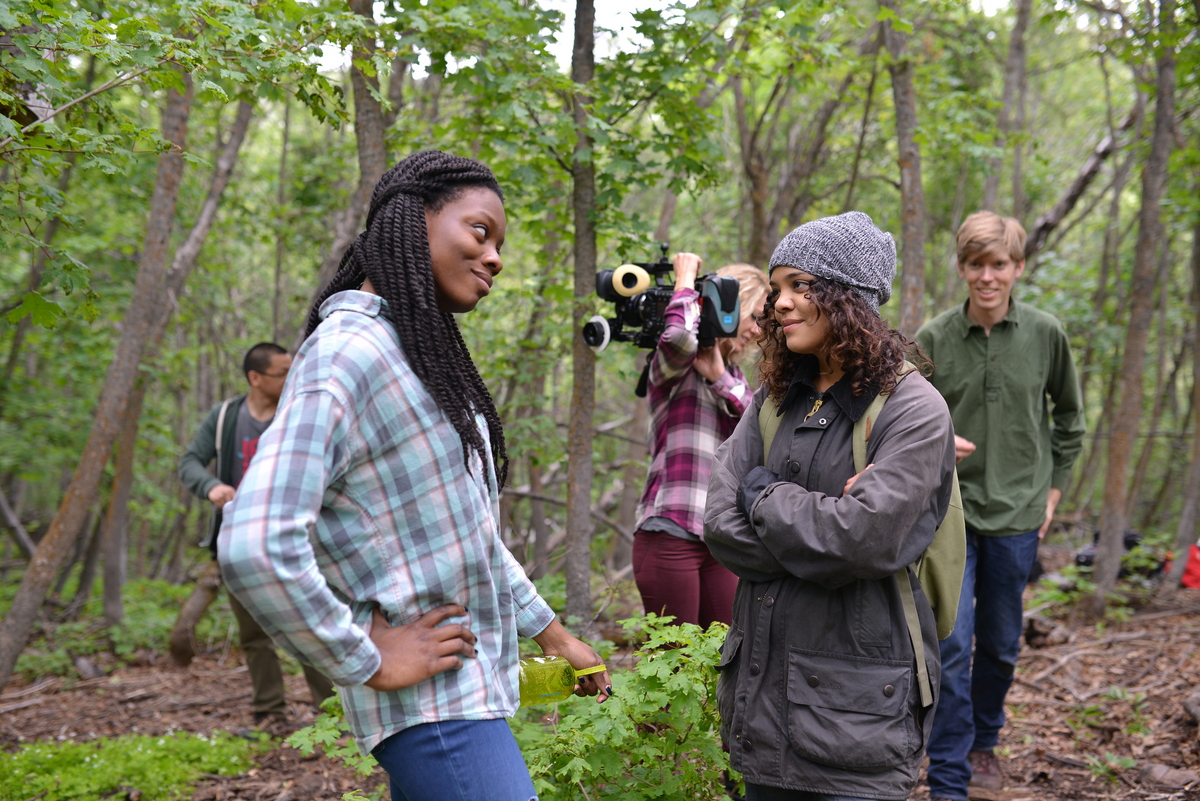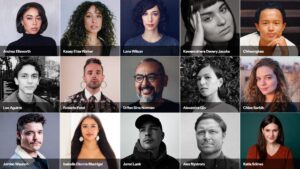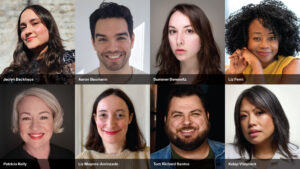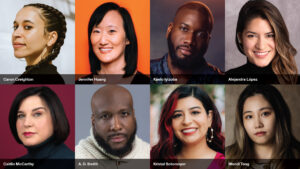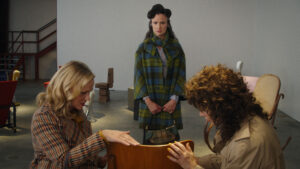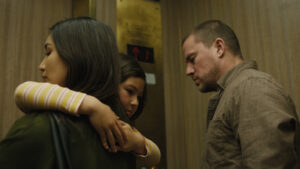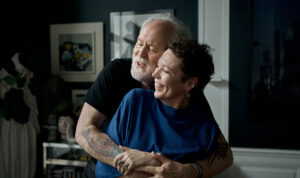Director Nia DaCosta and Tessa Thompson at the 2015 Directors Lab. (Photo by Brandon Cruz)
By Jessica Herndon
As the Sundance Institute Directors Lab turns 45, we’re celebrating this milestone by highlighting filmmakers who are an integral part of its legacy. Through this special series, we dive deep into the stories of directors who began their narrative feature filmmaking journey at the lab and went on to make an indelible mark on cinema. To ensure future fellows have access to this formative space, we invite you to make a gift and join us as we champion independent voices by keeping the labs alive.
For Nia DaCosta, the 2015 Sundance Institute Directors Lab gave her the self-assurance boost she needed to make her powerful feature debut, Little Woods. Fresh from earning her MA in writing for stage and broadcast media from London’s Royal Central School of Speech and Drama after gaining her BFA in film and television from New York University’s Tisch School of the Arts, DaCosta arrived at the lab when she was 25 years old.
“I was really intimidated because most of the other people had done a bunch of shorts or had done a documentary, and I had just graduated film school,” says a poised, fresh-faced DaCosta via Zoom from London, where she is in post-production for her film 28 Days Later: The Bone Temple. “It was nice to get reintroduced to filmmaking through the labs,” adds the filmmaker while sitting on the floor in front of a jean-upholstered couch, her braids pulled back in a bun. “It reminded me, after a year of just writing, of the director that I could become.”
From learning to trust her instincts to pushing herself to create her best work, DaCosta thrived during the lab. And toward the end of her immersive time in Utah, she recalls lab artistic director Gyula Gazdag boosting her confidence by expressing a highly validating fact. “Gyula Gazdag said to me, you’re a director,” she recalls. As she brings her right hand up to her heart, closes her eyes, and feigns an ugly cry, she continues, “I was like, ‘Thank you, Gyula!’ It was so meaningful, and I literally found a corner by myself and cried from happiness. It was amazing. Having done four scenes and having the amazing mentors that I had when he said that, I was like, ‘Wow, okay.’ It made me believe that I could make my first film.”
In the spring of 2019, Little Woods hit theaters. The gritty and emotional drama stars Tessa Thompson and Lily James as sisters who navigate life on the brink of financial collapse in a small, rural town in North Dakota. The film showcased DaCosta’s artful handling of intimate storytelling and her ability to draw memorable performances from her cast. “What brought me to Little Woods was wanting to show another American experience like in Frozen River or Winter’s Bone,” says DaCosta. “I think that sort of attention to cultural detail is important.”
A filmmaker who has gone on to direct Candyman, which she co-wrote with Jordan Peele and Win Rosenfeld, and The Marvels, starring Brie Larson and Teyonah Parris, Little Woods set the tone for DaCosta’s knack for building tension, even in moments of stillness, and her skill in portraying complex, layered characters.
Below, DaCosta discusses receiving invaluable advice from advisors Ed Harris and Tobias Lindholm during the lab, creating lasting bonds within the Sundance Institute community, and how she harnessed her power as a storyteller.
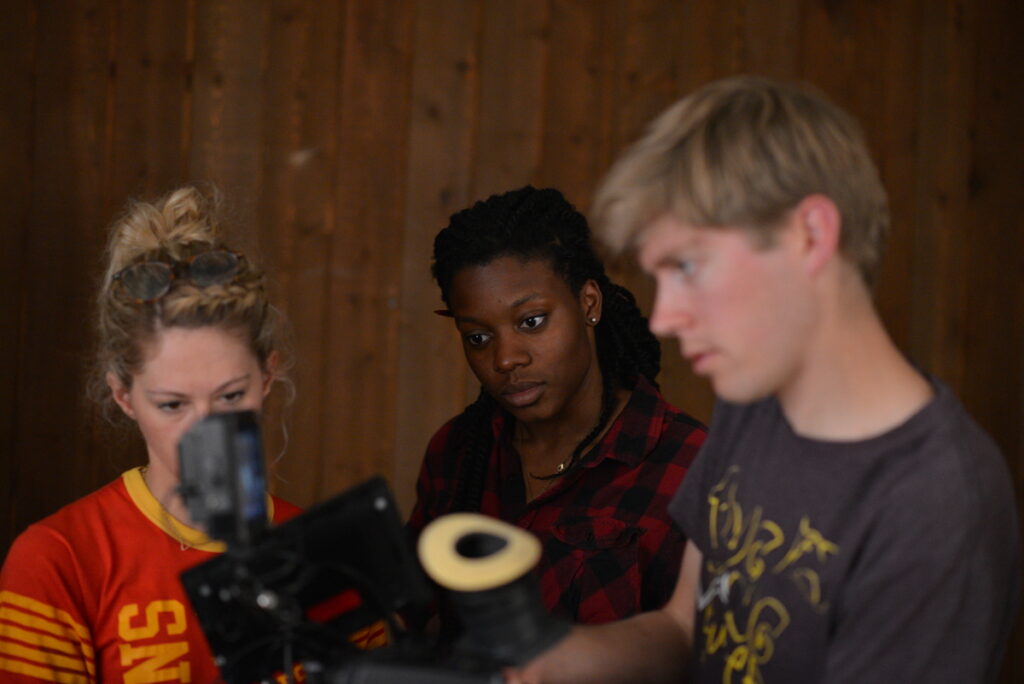
What was one of the most valuable lessons that you took away from the labs experience?
I think a part of that process is really being challenged, having your instincts and your intentionality and what you’re doing challenged. And through that, learning how to defend them and learning what it is that you’re doing, what your voice is. I think learning how to defend your voice is a way of learning what your voice is. I had such a good time being challenged there because it made me realize, “Oh, I’m doing that for a reason, and I can defend that reason.” And that tells me what kind of filmmaker I am or kind of filmmaker I’m turning into. I learned more about myself. I remember my one friend who was there [the same year]. He was amazing, and he was kind of getting a hard time [about his film], and I was like, don’t listen to them. You’re brilliant. What you’re doing is amazing. And he made the film, and he’s made many films, and it was great. It was just baptism through fire a bit. It’s so valuable to learn who you are as a filmmaker.
Was there a moment during the lab that helped you hone in on our creative voice?
One of the things that I got better at was directing actors. When you’re searching for what you need in the scene [from an actor], you have all these mentors who are there. I think Ed Harris was one of mine during one of my scenes, which was great and amazing. He comes in with all this energy, and he’s like, “What do you want in the scene? What is she doing?” It pushes you into that space of the actual craft of it at a place where you are really taken care of.
I broke into my skill of looking into a scene and seeing what the actors are doing, and figuring out how to keep the scene interesting, [while] still moving [the story] forward. That was something really specific that I learned a lot more about while I was there.
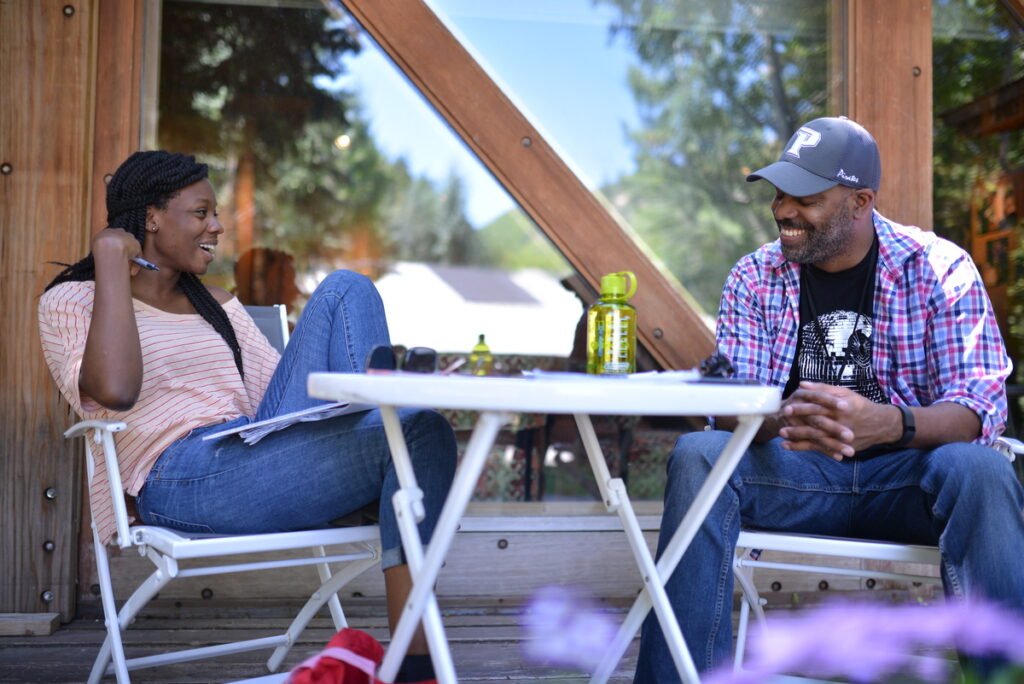
Can you remember a particular moment or piece of feedback during the labs that changed the trajectory of Little Woods?
There was something about the relationship between the three characters that was a bit messy and muddy, and Tyger Williams was like, “You have to specify what this is. You have to specify the relationship between the sisters and the different relationship they each have with this character, Ian.’” So, I did, and it was so much more defined, so much better.
I remember Tobias Lindholm, we were riding up on the ski lift to the top of the mountain, having our meeting on the ski lift and reading a scene, and he was like, “You’re a much better writer than this. You need to push more, push more because you have it.” And I think that changed the script as well. Having people believe in me and being like, “Oh, I think you can go further.” It forced me to not rest on my laurels. Not that I do anyway, because my mom always told me not to. How amazing an experience it was to do the labs. The amount of access, resources, context for entering the industry, and the amount of support they give — they really take care of you.
Was Tobias’s note on your writing something that you’ve carried with you?
For sure. I know I can write a good script. But then I tell myself, “You need to make it a great one.” So, that ethos has continued with me.
What was one challenge that you faced during the lab, and how did you push through?
I mean, honestly, I had the best time. But it was all hard. I mean hard in the sense that it was work, and it was hard to push yourself, and it was hard to be so exposed. You rehearse for a day, shoot for a day, edit for a day, screen it twice, do some editing, screen it again. And you do that four times over four weeks. It’s a lot. And you have these other filmmakers who are amazing and you’re like, ‘Am I shit? Am I a piece of trash?’ So, I think, honestly, the hardest part is keeping your confidence in the midst of it all so that you can enjoy it and actually get better.
The biggest trick actually, something that I take with me regardless — and what I tell [students] when I talk at my alma mater — is that your peers are so important. Leaning on your peers actually was the way we all got through it. If we were going to be competitive with each other, we never would’ve gotten the most out of that experience, and we never would’ve survived it. But everyone was amazing, and we all were just supporting each other and falling in love, loving each other’s work, and learning from each other. That’s how you push through.
Did you create lasting relationships at the lab?
A hundred percent. One of my closest friends is Bart Layton, and we met there. Laure de Clermont-Tonnerre, she’s someone who I talk to often. She’s great. I had an actor in 28 that I called her and asked her about because she worked with them. I really trust her. We all really had such a great time with each other.
I also met an editor [at the lab] who was doing Bart Layton’s film at the labs, and he just did Hedda, the same film Tessa was just in. [DaCosta wrote and directed Hedda.] Now, this is the second person I worked with from that lab, which is really awesome. Also, the labs put me together with my producing partner. They really have given me so much in that respect. Such a community, and to be able to build on that is amazing.
The Sundance Institute is rooted in the indie world, but you have gone on to also do the big budget Marvel film The Marvels. How did the labs help shape the way you view your role as a storyteller and director in the broader film industry?
I think coming from the independent world, and specifically being nurtured at Sundance over several labs and several years, really solidified my integrity as a filmmaker. That cannot be taken from me no matter where I go. I think that is a huge thing. At Marvel, you can have a reasonable conversation with Kevin [Feige]. He’s a good guy. But I’m also decisive. When I don’t know, it’s like, I’ll come back to it. But I’m really specific about that. I’m like, I’ll come back to this, this, and that, but here’s the answer for this, this, and that. Balance is good.
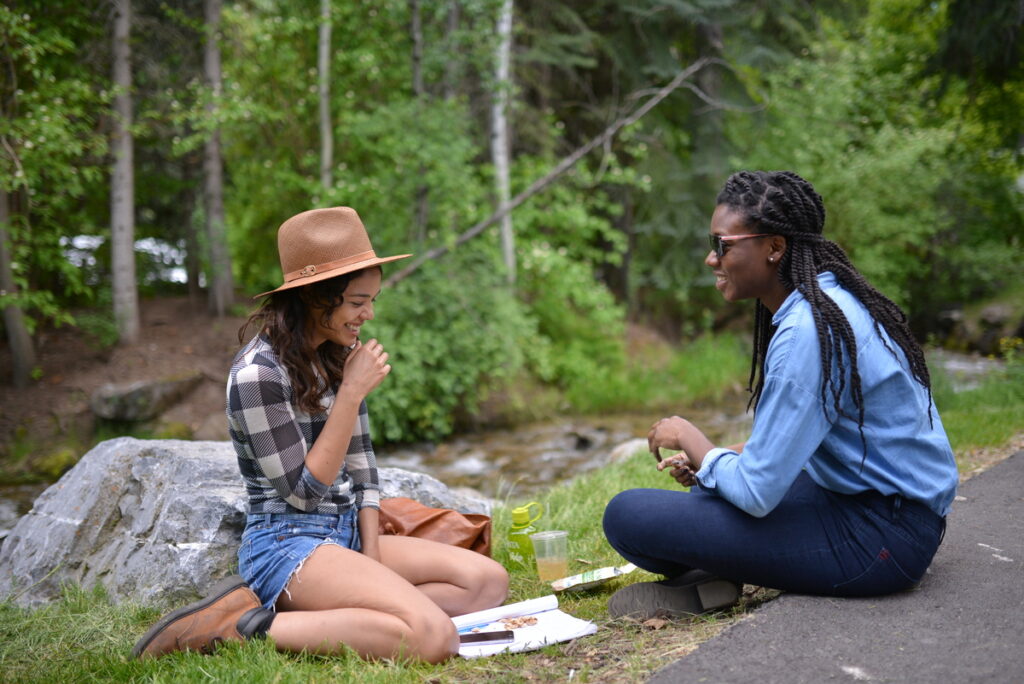
Tessa Thompson was one of the actors you worked with during the lab. You went on to cast in your feature. While working with her, did you know she was the one who should play Ollie in your finished film?
It’s so funny. I was not familiar with her work. I knew going in that I really wanted to work with Luke Kirby. I wanted to work with Emmy Rossum. Then, I didn’t know either of them. I was just a fan of their work. But then, with the Ollie role, I was like, “I don’t know.” My casting director was really great. He was like, “I think you should look at Tessa Thompson.” She’s really cool. And what I did was I didn’t really even look at her work. I looked at interviews with her because I was like, “I need someone who’s going to be able to do this process, to be in this workshop space and not bring anything into it except a love of the work and a desire to work and an openness.”
I watched this interview with her and Craig Ferguson where they were just talking about sandwiches, and I thought she was just so irreverent, funny, and she seemed very open and kind. I was like, “Oh, I think she has the right vibe, actually.” And then I saw some of her work, and I was like, “Oh, she’s also a great actress.” And so literally, it was off the back of a sandwich interview where I was like, “She’s the person.” And then, pretty much by day two of the labs, I was like, “I think you need to [be in this movie].” And she was like, “Yeah, I need to do it.” And she was in my first [movie], my third, my fourth, and the Marvel one.
Do you feel like the lab was an essential part of your filmmaking journey?
It was a huge part of my filmmaking journey and very practical in a business sense and creative sense. It just really, again, gave me that confidence that I could make movies. It taught me so much. I fostered so many amazing connections with people. Like Kasi Lemmons is amazing. I remember having dinner with her after the labs, and I was like, “Oh, I hope I can make my first film. I hope I can do this.” And she’s like, “There’s no hope you have to do.” She was very Yoda. I remember her saying, “There’s not that many of us. You need to do it.” Noted. I remember meeting Ava DuVernay at the Sundance Festival, and I was just like, “Hey, I just want to say I’m a big fan.” And she was like, “What’s your name?” I was like, “Nia, I’m a director.” And she’s like, “Oh, take my email.” Just like, boom, done. So, in that way, it’s really helpful.
But then another way, it’s like when you do the writer’s lab, and especially when you do the director’s lab, people are like, “Oh, who’s that?” I met my manager at a Sundance Festival after-party. I met my lawyer the next year at a Sundance brunch. My U.K. agent I know through Bart Layton.
What advice would you give to up–and–coming filmmakers who are hoping to attend the Director’s Lab in the future?
I would say the Directors Lab is not the goal. It is part of your path, and that is really important. You’re going to make this movie; whether or not you get in, you’re going to make this movie with their help and without their help. And I think it’s important to just remember that you are the one that gets it made. And all these people who are there to support you are a huge part of your journey, but you’re the most important part. And also, I think holding onto your peers and who you meet is so important. It is great to have mentors and a connection to get a job, but it’s really the people that you come up with that are going to be the most important.
